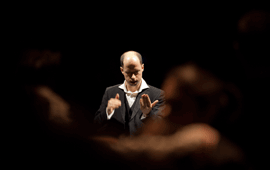> [Archived] Interviews

Ralf Sochaczewsky Conducts the Radio Chamber Orchestra
Ralf
Sochaczewsky, what are your thoughts on returning to the conductor’s
stand before the Radio Chamber Orchestra?
I come before these musicians for the third time. It is wonderful to be back. I consider it to be a valuable orchestra, a very important one for Bucharest. After collaborating on two concerts already, they know what to expect of me and the other way round. It is a flexible collaboration. We learn a lot from each other. They are open to my suggestions, to my vision of the scores and even to their positions on stage. It is a pleasant collaboration.
How did you find the return to Bucharest?
I feel very good here. It is an interesting city, in my opinion. You have a lot of wonderful buildings; the architecture blends the Eastern aspects with the Austro-Hungarian style. I find it extremely beautiful. It reminds me of Escher’s paintings.
Which were the arguments for the programme’s structure?
I was asked to include Mozart’s piano concert in the programme. I added DvoÝŠk’s serenade because I know the composer was in Vienna before writing it, and he listened to Mozart’s serenades – the one for strings and the one for brass. We can see this motif throughout the whole composition. We can feel Mozart’s influence over DvoÝŠk’s creation. There is also a connection between Brahms and DvoÝŠk. Brahms was one of his best friends and the one who helped DvoÝŠk. Brahms himself was inspired by Mozart’s music. When he wrote the serenade we’ll play tonight, the no. 1 in D major, Brahms was studying Haydn’s symphonies and teaching piano lessons by using Mozart’s concertos. So there are strong connections and influences between Mozart’s and DvoÝŠk’s music, just as there are between Mozart’s and Brahms’s.
What
is the word that best describes the encounter with Dana Borļan?
Extraordinary. As soon as we met we felt as if we’d known each other for 20 years. We’re collaborating for the first time and I’m sure it’ll be great. We have the same vision of the work; we see the music in the same way. This may be due to the fact that we both studied at the same academy.
The
concert is scheduled on a special day. 15th
January is Mihai Eminescu’s birthday and the National Culture Day
of Romania. What does this context mean to you?
I remember it was an important day when I conducted the orchestra here last time. It was the International Radio Day. It is an honour for me to lead an orchestra on such a day. In this day and age, everything seems to take precedence over culture. It is vital to have such holidays to remember the cultural personalities of a nation. As I was saying, I feel very honoured to be able to conduct on such a day.
You know the Romanian audience. What are your expectations of
those who will be there tonight?
It’s a difficult question. I wouldn’t say I expect anything of the audience. I am glad to see a full hall that pays attention to what we do on stage. As a conductor, I feel I have to serve the audience. Every time I wish to convey exactly what the composer meant with those works. If we manage to do that, the audience will be pleased and will show it. The goal is for me, the orchestra and the audience to become one and to have the same ideas about the scores. This is what I think is the role of music. What musicians want to convey should be the same thing the audience perceives. I am merely the connection between the audience and the orchestra. The audience in Romania is a warm one. I feel very good here.
What
is your message for this evening’s audience and for our listeners?
I am very pleased to invite you to our concert tonight. We will offer a special programme. DvoÝŠk, Brahms and Mozart, all three of them composers I hold dear, and I am sure that after the concert you will be glad you could attend this event.
Translated by Irina BorĢoi and Elena Daniela Radu
MTTLC, The University of Bucharest














